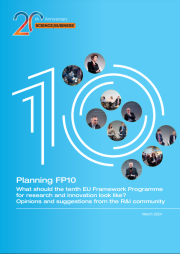A special report on the ideas circulating around Brussels on how the European Commission could shape its next Framework Programme for research and innovation
Get your free copy

We are four years from its start. We have no idea what the budget will be. We haven’t even finished evaluating the current programme. Yet already, planning is in full swing for a next EU Framework Programme, FP10.
That means Brussels is echoing with views, pro and con, on any Framework-related issues. Some say FP10 should have a €200 billion budget; no, say others, it will be lucky to keep the current seven-year budget of €95.1 billion. FP10 should focus more attention on fundamental research; no, innovation that boosts productivity is what’s needed. FP10 should kill “missions” for grand policy goals like curing cancer; no, it should embrace dual-use, military-civilian technologies to defend Europe from a Russian menace. So many views, so many lobby groups.
Of course, duelling opinions have always marked Framework planning. But since the Millennium, rising global R&D budgets and the outsize importance of science and technology have turned a focused question – how to support R&D? – into a full-blown political contest.
And it matters how this story ends. Already, Framework – better known by its current brand name, Horizon Europe – is arguably the world’s largest international, multidisciplinary, civilian research programme, nearly twice the size of the US National Science Foundation. In its first few years, it has funded 21,500 applicants with €30.5 billion. It has expanded beyond Europe and its neighbours to include Canada, New Zealand and soon, most probably, Korea. It funds satellites, AI, mRNA, tokamaks, particle accelerators, postdoc travel grants, aircraft engines, hydrogen power, Arctic research, atomic clocks and much more.
Given the importance of the debate, on 12-13 February 2024 Science|Business gathered representatives of its 75-member Network to focus the discussion on some key issues. At a Brussels conference centre, delegates from universities, companies and public-sector organisations spent an afternoon in workshops on FP10 planning. After the workshops, they met with some of the leading policy-makers for FP10 planning in a public conference.
This report is a summary of the opinions and suggestions expressed in these meetings, and in the pages of our Science|Business news service in recent weeks.

 A unique international forum for public research organisations and companies to connect their external engagement with strategic interests around their R&D system.
A unique international forum for public research organisations and companies to connect their external engagement with strategic interests around their R&D system.